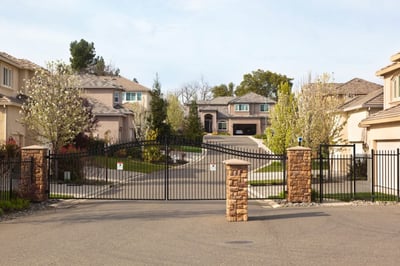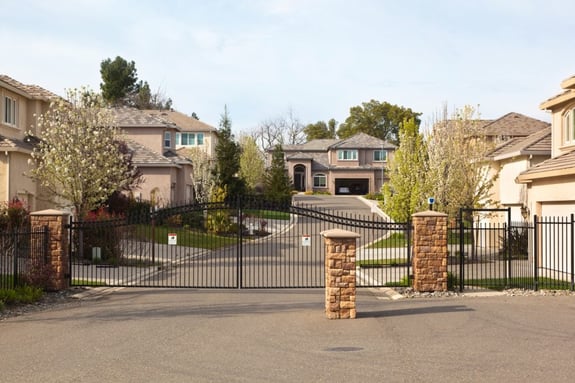Even though gated communities have fences, they can still offer a false sense of
security because of vulnerabilities in the physical security and a lack of a
security program that integrates people, procedures and equipment.
 Do gated communities mitigate criminal activity from occurring in the neighborhood?
Do gated communities mitigate criminal activity from occurring in the neighborhood?
Residents tend to feel they can leave their car doors and front doors unsecured because they live in an area with fences that surround its perimeter. But criminals see gated communities as a target-rich environment because of residents that put their guard down and invite these threats into the
neighborhood because of a lack of security awareness.
The National Insurance Crime Bureau reported that South Florida takes the number
one spot for stolen vehicles with over 20,000 car thefts among Miami, Broward
and Palm Beach counties. "A trend we've noticed lately is overnight auto
thefts and auto burglaries in neighborhoods," said Palm Beach Gardens
Police Major Rogers.
When it comes to the people aspect of a security program, it includes all who live and work in that community, and this requires security Buy-In from everyone to help foster a safe and secure community.
Residents
- The trees around the home should be trimmed and the branches and bushes should be trimmed to 3ft around the perimeter of the house. This allows for natural surveillance from the street and other dwellings.
- Turning on the outside lights is a crime prevention technique that helps illuminate the property which will deter criminal activity. LED lighting will provide the best illumination and is energy efficient.
- Awareness - Residents should be aware of their surroundings by being "situationally aware." Knowing who your neighbors are and who should be in the neighborhood.
- Establish a "See Something, Text Something" program that can send non-emergency text messages to a security patrol officer to investigate.
Community Staff
- Community Staff such as the landscapers and maintenance personnel should promptly report issues that may create vulnerabilities, such as a broken fence or wall.
- Trimming bushes and trees will allow natural surveillance and natural lighting into the community.
- Communications through management to alert residents of crime issues in the community and around the local areas.
- Implement a community newsletter with security tips and updates for residents.
Security Staff
- Training and pro-active management from the security service vendor is essential to the implementation of the community’s security program.
- Access control, such as a staffed security gate or a virtual guard is a vital function for deterring criminal activity and unauthorized access.
- Some properties may have a security patrol service. These officers should be engaged in the community and deter criminal activity. Patrol lights should be on at night, and front windows should always be open on patrol (Weather Permitting) to allow the officer to use their senses. They should also wave at people to see if someone may act suspicious, typically non-suspicious people wave back.
- Also, if someone may seem suspicious, these officers should have the ability to qualify people by asking, "Can I help you?" Criminals do not want to be recognized or identified, and this can help deter criminal activity in the neighborhood by having pro-active security services.
Procedures
- Security Policies- the community stakeholders such as the Board of Directors create security policies. These are the security rules of the community that are executed by the property management company to ensure the safety and protection of the community assets. These may include, for example, no person being allowed to enter the community unless they present a valid ID. Then this is executed by the security staff controlling access into the community.
- Security Procedures are directions for management and the security staff to follow that provides them with detailed instructions on how to carry out the security policies.
- Post Orders are a procedural checklist for security staff to carry out of a specific post that is short instructions created from the security procedures.
Equipment
- Physical security is a vital function of an adequate security program. Communities are not looking to build Fort Knox, but having physical barriers such as fences, walls, and vegetation around the gated community helps define the borders, creates natural access control, deters, and delays unauthorized access.
- Entry points for gated communities require a barrier to prevent unauthorized access to vehicles and people. From gate arms to automated gates, having the correct equipment will help mitigate threats gaining access.
- Camera systems help deter and detect criminal activity. Adding a license plate recognition camera will track all license plates that made entry into the community and create data that can be used quickly by law enforcement. Cameras should be placed in strategic locations that allow for a full view and can identify both people and vehicles. Video surveillance should be applied based on the application. Why are you recording this area and what type of footage would be helpful should an issue occur? Do the cameras alert, or must they be watched 24/7? Camera technology today is impressive and can alert management or security staff should something trigger its alarm. For example, teens in the community pool after hours, the alarm is set when the pool is closed, and the camera will alert should a person make entry after hours.
- Placing security signs on the outer perimeter that provide verbiage such as "No Trespassing, Private Property or Property under Video Surveillance.” These signs should be visible for pedestrians and be placed in 100ft intervals on the wall/fence or a pole. Signs are a deterrent.
Having a
security program that integrates people, procedures, and equipment should be
the goal of any gated community to protect their assets, reputation, and to
promote a safe and secure community.
By Patrick Miller, CPP. Patrick is a Board Certified Security Consultant and a trusted security advisor for residential and commercial clients. He is a Marine Corps Combat Veteran and has a Bachelor's Degree in Security Management. Additionally, he was appointed by the State of Florida and served a 4-year term as a subject matter on the Private Investigations, Recovery, and Security Advisory Council under the Department of Agriculture and Consumer Services and was appointed by Governor Desantis to serve on his transitional Public Safety Committee. Patrick continues to help his fellow Veterans as a board member of the Wounded Veterans Relief Fund.
